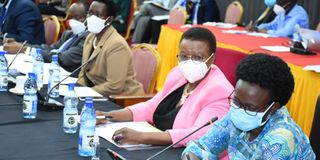Govt earmarks Shs680b for Covid-19 vaccines

Ministry of Health officials led by the minister Jane Ruth Aceng (right), State Minister for Health in-charge of General Duties Hanifa Kawooya (2nd right) and Permanent Secretary Dr Daina Atwine appears before the Parliament’s Health Committe on Wednesday. PHOTO/ALEX ESAGALA
What you need to know:
The Health ministry says it has already received Shs121.5b to procure vaccines.
The government has earmarked Shs681.5 billion to procure Covid-19 vaccines, an amount which can buy the relatively affordable AstraZeneca vaccines for 13.6 million people at the rate of Shs$7 (Shs24,850) per dose in case each person is given two doses.
The vaccines for the said number of people means the country may have to rely greatly on foreign donations to meet the target of vaccinating 21.9 million people before opening the economy, which is limping due to the prolonged lockdown.
The government, as of yesterday, had inoculated 1.1 million people and of these, only 233,950 have received the recommended two doses.
This means up to 95 per cent of the target population is yet to get the jabs.
At the same rate of $7 per dose, the government needs at least $291m (Shs1 trillion) to procure enough vaccines for 20.8 million people who have not yet been vaccinated from the target population.
But the Health ministry is also planning to vaccinate children aged between 12 and 18 years to allow for safe reopening of schools because some vaccines have now been approved for use in the youngsters.
Children were not included in the initial vaccination plan of vaccinating 21.9 million people.
The revelation about the Shs681.5 billion for vaccines comes just a few days after the government availed Shs105b in the middle of a disastrous pandemic for 529 Members of Parliament to acquire new cars, an amount that could procure about 7.5 million jabs.
All the country’s missions abroad have since been tasked to hunt for Covid-19 vaccines.
The Health minister, Dr Jane Ruth Aceng, while appearing before the Parliamentary Committee on Health on Wednesday, said part of the Shs681.5 billion was directly given to the her ministry.
“[The] government has allocated Shs121.5b to the Ministry of Health to procure vaccines through any available channel. In addition, Shs560 billion is available with the Ministry of Finance, Planning and Economic Development ready for disbursement should any opportunity be available,” she said.
Despite the clear evidence that the money for the vaccines is less and the increasing concern from activists that the government has not allocated enough funds and attention to securing enough vaccines to put an end to the lockdown, Dr Aceng told the legislators that the biggest issue is with getting where to buy vaccines from.
“The Covid-19 mass vaccination programme has been slowed down by the global shortage of vaccines on the market where the global demand outweighs the production. Much of what is produced is taken away by the rich countries that had paid prior during the research and development process. As such, most African countries [including Uganda] are unable to access adequate vaccines in spite of availability of funds,” she said.
The minister, however, said the government has instructed Ugandan embassies in foreign countries to hunt for vaccines and alert the Ministry of Health accordingly.
“In this respect, to address the high risks of fraud, unreliable sources and fake vaccines, government has put in place a technical and an inter-ministerial committee to guide decisions,” she added.
The minister said they are also going through Covax and African Union to be able to break barriers and access some doses of vaccines.
Dr Aceng said through the initiatives, government has already made tremendous progress.
“The legal requirements between Uganda, the Covax facility and the African Union have been concluded. An order of 9 million doses of the AstraZeneca vaccine has been placed with the Covax facility. We await feedback on availability. In addition, an order of 2 million doses of the Johnson and Johnson vaccines has been signed up with the African Union and a down payment of $3m (Shs10.5b) has been effected,” she said.
Early this month, the ministry revealed that the government transferred $11m (Shs38.8b) to the United Nations Children’s Fund (Unicef) for procurement of vaccines through the Covax initiative under a cost-sharing arrangement.
Background
Vaccination plan
The initial plan for procuring vaccines was in February, when government had planned to buy 18 million Covid-19 doses of AstraZeneca from Serum Institute in India (SII), but it all hit a snag following high Covid-19 cases in India as swathes of its population suffered the deadly wrath of the virus.
The government frustration was lessened after the Indian government donated 100,000 doses of AstraZeneca immediately after 864,000 doses of the same type of vaccines were received by Ugandan government through Covax in March.
Using the free doses of vaccines, the government launched a national vaccination drive on March 10, an exercise that has seen a cumulative total of 902,293 people receiving the first dose of the vaccine, while 233,950 received the two doses of the vaccine.
Mr Emmanuel Ainebyoona, the Health ministry spokesperson, said the country expects to receive more donations of 286,080 doses of AstraZeneca vaccines, which arrives in the country today (July 30) and 300,000 doses of Sinovac expected in the counry tomorrow from the Chinese government in fulfilment of their promise.
Dr Aceng also said in a move to increase vaccine coverage, they will allow organisations to procure vaccines from reliable sources to inoculate their staff and that the vaccines will be handled through National Medical Stores.




